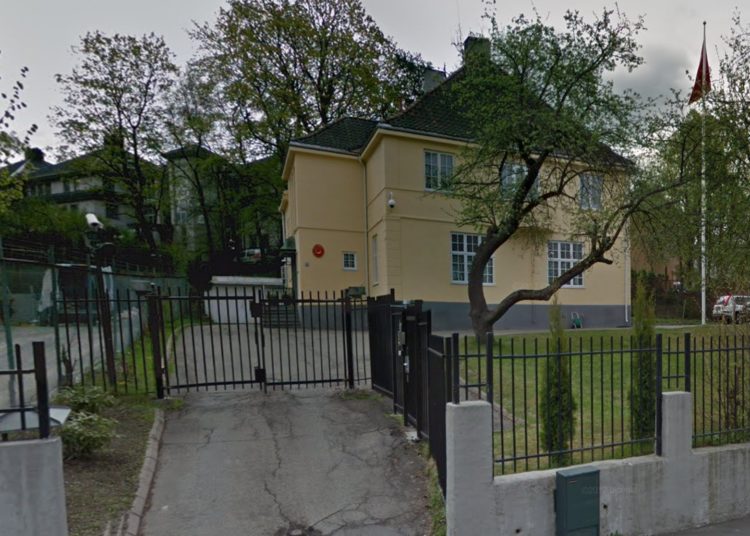Nordic Monitor
Secret Turkish Foreign Ministry documents obtained by Nordic Monitor reveal how Turkish diplomats collected information on the activities of critics of Turkish President Recep Tayyip Erdoğan in Norway, profiled their organizations and listed their names as if they were part of a terrorist organization.
An official document from the Directorate General for Consular Affairs at the Foreign Ministry dated October 21, 2016 confirms clandestine spying activity in Norway that has long been suspected. The document shows how critics who have been living in Norway for decades as well those who have recently sought refuge to escape a massive crackdown in Turkey were spied on.
The clandestine efforts by elements of the Turkish regime target critics as part of President Erdoğan’s long arm and campaign of intimidation to suppress dissenting voices even among diaspora groups. Information gathered by Turkish diplomats in Oslo was conveyed to the Ankara Governor’s Office by the ministry to initiate criminal proceedings against those who were named by the Turkish Embassy in Oslo.
According to the official correspondence, 45 Turkish and Norwegian nationals who are representatives of Norwegian schools, dialogue foundations and human right institutions were profiled as members of a terrorist organization by Turkish diplomatic personnel. The critics and institutions are believed to be affiliated with the Gülen movement, a vocal critic of the Erdoğan regime for pervasive corruption in the government and Erdoğan’s arming and funding of radical jihadist groups in Syria and Libya.
Secret Turkish Foreign Ministry document that confirms clandestine spying activity by Turkish officials in Norwegian territory: (Names were redacted for security concerns)
Some of the Turkish nationals left their positions in these organizations in the aftermath of a failed coup on July 15, 2016, the communiqué said.
A postscript in the document showed that the list was also distributed to the Ankara Police Department for further administrative or legal action against the people who were profiled. It is clear that the file created in the Turkish Embassy triggered many criminal prosecutions on charges of terrorism. The paper trail shows instructions were conveyed to police departments in various provinces where the population registry data were kept about the people profiled.
In addition to the arbitrary punishments in Turkey on dubious criminal charges, people who were listed in the document were also denied consular services in Oslo.
In Turkey, over half a million people affiliated with the Gülen movement have been put in detention facilities in the last three years alone on similar charges. Based on profiling lists, people were arrested, investigated and even prosecuted in Turkey. Their assets were seized, and family members and relatives were also the subject of criminal charges. Working as a teacher in schools run by the Gülen movement abroad or sending children to those schools is considered to be an act of terrorism by the Erdoğan government.
As seen in previous reports by Nordic Monitor, Turkish diplomatic missions violated the domestic laws of receiving states and the principles of international law by conducting unlawful information-gathering campaigns and sweeping intelligence operations. Similarly, this correspondence confirmed that Norwegian organizations that were duly authorized and licensed under local law are described as terrorist entities by the Turkish Embassy in clear contradiction with the perspective of Norwegian authorities.
Among the organizations that were spied on by Turkish diplomats were the Norlights International School and Oslo Wergeland International School, which were funded by the Norwegian state. In addition to the Norwegian-Turkish Chamber of Commerce, intercultural centers and nonprofit and volunteer organizations such as Moss Kultur-org, Mangfoldhuset Trondheim and Mangfoldhuset Ung were among the institutions profiled by the Turkish Embassy, according to the document.
Turkish Government spied on Norwegian organizations:
Scandalously, Time to Help, a well-known humanitarian aid organization, was also listed in the espionage document dispatched by Turkish diplomats in Norway. Time to Help has successfully completed major projects in a range of countries, including sinking wells, providing medical care for cataract sufferers and setting up food tents and bringing relief to people affected by disasters.
The Turkish president turned against the Gülen movement after major corruption investigations in December 2013 that incriminated Erdoğan, his family members and his business and political associates. The order to spy on Gülen-affiliated people and organizations came in early 2014, and volunteers of the movement were targeted with criminal prosecutions on fabricated charges of terrorism.

Nordic Monitor previously published a report disclosing the scope and extent of major spying activity conducted by Turkish diplomatic missions. The report revealed that Turkish diplomatic and consular missions around the world have systematically spied on critics of the president and collected information on Turks living in exile and transmitted it to headquarters.
The immunities and privileges of diplomats and consular staff are governed by international conventions. However, diplomats enjoying the privileges and immunities described in the Vienna Convention on Diplomatic Relations are bound to respect the laws and regulations of the receiving state and to avoid interfering in its internal affairs as detailed in Article 41. Similarly, consular staff are granted limited privileges and immunities by the Vienna Convention on Consular Affairs, but host state authorities can start investigations and prosecute any of the personnel if they perpetrate crimes inside or outside the consulate premises according to Article 43 of the convention.












